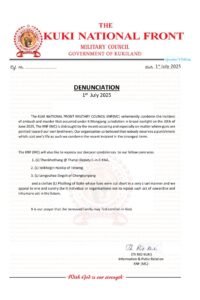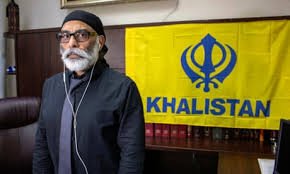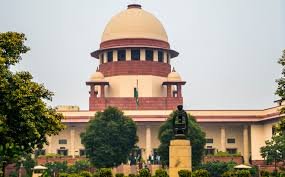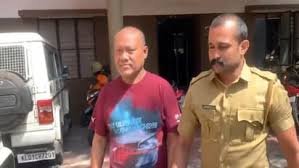The Kuki National Front (Military Council) has denounced the June 30 killings in K. Mongjang, warning that internal violence undermines the Kuki-Zo political struggle.
BY PC Bureau
July 2, 2025 — The Kuki National Front Military Council (KNF‑MC) has condemned the June 30 ambush at K. Mongjang, which resulted in the killing of three senior cadres of the Kuki National Army (KNA) and a civilian woman. KNF‑MC decried the attack as an act of “cowardice” and has appealed to all Kuki factions to halt internal violence.
The deceased included: Thenkhothang “Thahpi” Haokip (48), Deputy Commander‑in‑Chief, KNA; Seikhogin Haokip (34), KNA cadre from Teiseng; Lengouhao Singsit (35), KNA cadre from Chengkonpang; Phalhing (72), a civilian from Koite, caught in crossfire
In a statement issued July 1, KNF‑MC asserted: “Our organisation believes nobody deserves a punishment costing one’s life. We condemn the incident in the strongest terms.”
Emphasizing the tragedy of fratricidal violence, KNF‑MC extended condolences to families and prayed for their comfort.
READ: In a Rebuff to China, Dalai Lama Says Tibet Will Choose His Successor
The self-styled United Kuki National Army (UKNA) has publicly claimed responsibility for the ambush, citing retribution as its motive UKNA’s information & publicity department released a justification stating that Thahpi and his aides were “punished” for alleged involvement in the killings of prominent UKNA figures, including leader Tamin Hunter and its PRO, Satkhohao Haokip, and causing the deaths of over 30 individuals
UKNA–KNF/KNA Split Widens
The UKNA, which has not signed the government’s 2008 Suspension of Operations (SoO) pact, is a breakaway faction with ideological and territorial disputes against KNF‑aligned forces. The KNA is the armed wing of the Kuki National Organisation and is an SoO signatory; UKNA operates autonomously and has repeatedly clashed with its parent group.
This deadly confrontation underscores increasing fragmentation amid the broader Kuki-Zo struggle for autonomy in Manipur.
Following the ambush, authorities recovered over a dozen spent 5.56 mm casings at the scene, and a police FIR was filed at Churachandpur PS Security forces have launched intense combing operations in the area amid fears of further retaliatory violence
Kuki civil society groups have condemned the incident, stressing the need for internal unity and cautioning that such violence weakens ongoing peace efforts.

The KNF, part of the broader Kuki-Zo tribal insurgency, seeks to establish an autonomous or independent state for the Kuki community. The group’s roots trace back to decades of ethnic strife between the Kuki and Meitei communities, exacerbated by land disputes and competition for resources.
READ: Govt Allows Ola, Uber to Double Fares During Peak Hours
The KNF has complex affiliations within the Kuki militant landscape. Currently, it operates under the umbrella of the United People’s Front (UPF), alongside a Suspension of Operations (SoO) agreement with the Government of India. However, its historical ties and internal splits have also linked it to the Kuki National Organisation (KNO) at various points. Initially formed on May 18, 1988, by Ranco Thangboi Kuki to counter NSCN-IM hegemony, the KNF later experienced factional divisions, with some factions aligning with the KNO (e.g., KNF Military Council and KNF Zogam) under the 2008 KNO umbrella, while others, including the KNF President group, helped form the UPF.














